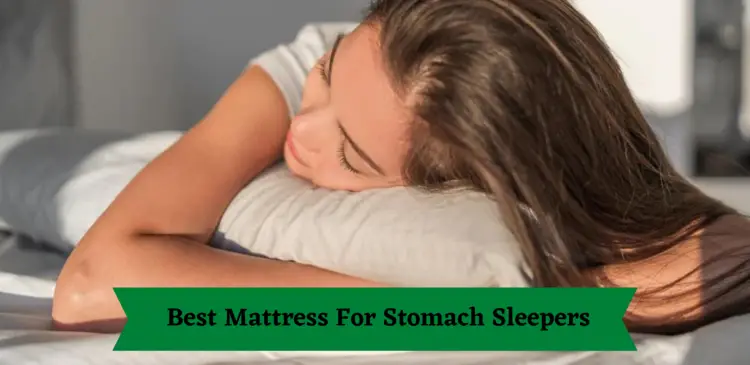Though stomach sleepers often experience aches and pains due to the added pressure on their neck and spine, the right mattress can make a difference. A mattress that supports the hips can prevent sinking in too deeply. This keeps the spine aligned, which reduces the likelihood of lower back pain. Since stomach sleepers are likely to turn their face to one side, this can cause strain on the neck and shoulders. Contouring materials offer pressure relief and even weight distribution, which can prevent some of the aches and pains associated with sleeping on your stomach. Though there are drawbacks to sleeping on your stomach, there are a couple of benefits as well, which we’ll cover in this guide. We’ll also review our top picks for the best mattress for stomach sleepers. We include more information on what type of mattress is best for stomach sleepers and why, features to look for when mattress shopping, and what factors to keep in mind. Since stomach sleepers need custom support for their head and neck, we’ll also go over different pillow types and sleep accessories that can help you get a better night’s sleep.
Best Mattresses for Stomach Sleepers: Buyer’s Guide
Purchasing a new mattress can feel overwhelming for anyone, but there are unique factors that stomach sleepers especially need to consider before buying a mattress online. There are benefits to sleeping on your stomach, but it can put a lot of pressure on your neck, back, and nerves. We’ll cover which mattress type is best, what features to look for, and other factors to keep in mind when shopping for a mattress.
What Type of Mattress Is Best for Stomach Sleepers?
The best mattress for a stomach sleeper will offer both support and comfort. Stomach sleeping can cause neck pain and put unnecessary strain on the back. Contouring comfort layers offer pressure point relief, which is beneficial for stomach sleepers since their hips press more into the mattress. Taking pressure off of the lower back helps to keep the spine aligned. Stomach sleepers may find they shift more throughout the night to get comfortable, meaning motion isolation will be important if they share the bed. Since people who sleep on their stomach lay face down, a breathable mattress is also ideal. Choosing the right firmness is also essential, since the mattress should be firm enough to prevent the hips from sinking in too far while still cushioning the chest and ribcage. For each of the four common mattress types, there are benefits and drawbacks to be aware of when making a decision. These are outlined in the table below.
Latex
Innerspring
Hybrid
A memory foam mattress is constructed with comfort layers of viscoelastic memory foam. The support base is usually high density polyfoam, which adds durability to the mattress. Memory foam is responsive and contours closely to the shape of your body for pressure point relief. Traditional memory foam can restrict airflow and retain heat, but newer foams include open-cell memory foam and gel-infused memory foam to offset this.
Average Price:
On average, a memory foam mattress costs between $500 to $1,000. Luxury models are available, and can cost upwards of $4,000.
Pros for Stomach Sleepers:
- The contouring properties of memory foam help keep the spine aligned, which can prevent back pain for stomach sleepers.
- High density foam offers consistent support and prevents the hips from sinking in too deeply when sleeping on your stomach.
Cons for Stomach Sleepers:
- Memory foam has a tendency to retain heat, and is less breathable than natural materials.
- Memory foam mattresses can be too soft for stomach sleepers, resulting in misalignment of the spine.
- Memory foam mattresses often lack edge support.
Important Mattress Features for Stomach Sleepers
Buying a new mattress can be difficult, with many elements affecting the final decision. For stomach sleepers, the right mattress can make all the difference. Certain mattress features alleviate the aches and pains associated with stomach sleeping and ensure that stomach sleepers are properly supported. Additional factors should be taken into consideration if you share the bed. Everyone has unique needs, so the following factors may vary in importance.
- Size: Stomach sleepers need enough space to sleep comfortably and change positions as needed. When deciding on a mattress size, consider the size of the bedroom, whether or not you share the bed with a partner, and your budget. The thickness of the mattress may also play a role in the decision-making process, as a thicker mattress can be more supportive.
- Support: Support indicates how well a mattress keeps the spine aligned by providing an even surface. This is one of the most important factors for stomach sleepers. Proper support can reduce pressure on the lower back. It also ensures the hips do not sink into the mattress too deeply, which puts the spine in an unnatural position. The chest and shoulders should also be supported.
- Contouring: Contouring relieves pressure points and helps keep the spine aligned by adapting to the natural shape of the body. A conforming mattress responds to deeper areas of pressure, like the hips of stomach sleepers. Memory foam and latex mattresses are best at contouring, while innerspring mattresses conform less.
- Firmness: Whether you choose a soft or firm mattress will depend on personal preferences and body weight. Stomach sleepers typically do best in the medium soft to firm range, depending on their weight. A firmer mattress prevents sinking in and can help support the body, but it should not be so firm that the chest and shoulders are uncomfortable. For couples who share the bed with a partner with differing preferences, a medium-firm mattress often provides a good balance of support and comfort.
- Motion Isolation: Stomach sleepers may shift positions throughout the night, which can cause sleep disturbances if the mattress transfers motion. Memory foam isolates movement exceptionally well. Latex foam can absorb movement as well, while innerspring coils are more likely to transfer motion.
- Temperature Regulation: Stomach sleepers who sleep hot will benefit from temperature regulation. This prevents overheating. Breathable, natural materials wick away heat and moisture, and are better for stomach sleepers who sleep face down.
- Edge Support: A reinforced perimeter improves edge support in a mattress and prevents sagging over time. This is helpful for stomach sleepers who sleep on the edge of the bed, as it provides consistent support. While foam mattresses typically lack edge support, hybrid and innerspring mattresses are likely to have reinforced perimeters.
- Price: Stomach sleeping on an unsupportive mattress can cause neck and back pain, so a quality mattress that relieves aches and pains is a valuable investment. Mattress prices range from $500 to $5,000, so setting your budget before shopping is necessary.
About Stomach Sleeping
Stomach sleeping is not very common, with only 7% of people reporting that they sleep on their stomach in what is referred to as the freefall position. Stomach sleepers typically sleep face down with their arms at their sides, by their head, or under the pillow. Their legs are typically straight. Some find that it is more comfortable to bend a knee, though this can put pressure on the lower back. To breathe easily, stomach sleepers typically turn their head to one side, or prop their forehead up with pillows.
Though sleeping on your stomach is not usually recommended by medical professionals, there are a couple of benefits to stomach sleeping, which are outlined below.
- Reduces snoring and symptoms of sleep apnea: Obstructive sleep apnea is caused when your throat muscles relax, and the tongue and soft palate obstruct the airway. This can result in snoring, gasping for breath, and restless sleep. Sleeping on your stomach, especially if you are face down with your forehead propped up, keeps the airway open. This prevents the tongue from restricting airflow and reduces snoring.
- Can be better for digestion: Sleeping on your stomach can provide relief for the digestive system. This results in less bloating and gas. It also aids in digestion.
Though there are benefits to sleeping on your stomach, there are also potential downsides that should be taken into consideration.
- Puts strain on the neck: Many stomach sleepers turn their heads to one side, which puts strain on the neck and shoulders. This can cause neck pain, which may worsen over time.
- Causes aches and pains throughout the body: The weight of your midsection can pull your spine out of alignment when sleeping on your stomach. This can also affect the nervous system and cause pain throughout the body. Back pain is especially common for stomach sleepers.
Stomach Sleeping and Body Type
Comfort is subjective, and can be affected by body type and weight. For stomach sleepers, a supportive mattress will prevent the hips from sinking in and keep the spine aligned. How well a mattress accomplishes this will depend on its firmness and your body weight. The heavier the sleeper, the more pressure that puts on a mattress. The following table outlines the most suitable firmness range based on body weight.
Additional Sleep Accessories for Stomach Sleepers
While a supportive mattress is likely the most important purchase a stomach sleeper can make for their sleep health, there are additional accessories available that can optimize their sleep environment. Pillows and mattress toppers can offer customized support and comfort.
Pillows
Pillows provide additional support for the head, neck, and shoulders. Not all stomach sleepers use a pillow, since a thick or stiff pillow can put the head and neck at an uncomfortable angle. For those who do use a pillow, a low or adjustable loft is typically ideal. This reduces the amount of strain on the neck. Pillows can also be used to prop the forehead up and make it easier to breathe. There are a wide variety of pillows available, including down, cotton, and shredded foam pillows. Breathable, natural materials are recommended for stomach sleepers who face down. Thin pillows can also be used under the abdomen or hips to elevate them slightly and keep the spine aligned.
Mattress Toppers
A mattress topper sits on top of your current mattress as an added comfort layer. For people who have a newer mattress but want to change the overall feel, a mattress topper is a good option. It can be used to make a softer mattress feel more firm for stomach sleepers. Mattress toppers are available in some of the same materials used in mattresses, including latex, memory foam, down, and wool. Latex and memory foam toppers are typically preferred by stomach sleepers, since they offer pressure point relief and gentle contouring. This helps keep the spine aligned. It is best to avoid a plush soft mattress topper, unless you are a lightweight stomach sleeper. Mattress toppers can also improve motion isolation, temperature regulation, and overall support.







